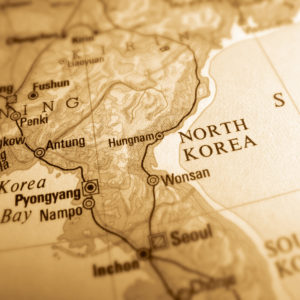WASHINGTON — North Korean success in test-firing an Intercontinental Ballistic Missile puts the new South Korean government in the difficult position of having to appear tough while still looking for dialogue with the North.
South Korea’s President Moon Jae-in laid the groundwork for deepening rapport with the United States in a summit with President Trump that was surprisingly free of disagreement on North Korea. Far from pulling out their stilettos, jabbing one another with sly innuendos if not full-frontal attacks, Trump and Moon agreed in two days of talks in Washington that South Korea should take the lead in negotiations with North Korea.
At the same time, Moon seems convinced that North Korea has to be persuaded to halt its nuclear program — something he had said long before the summit but reiterated again in Washington. The North’s latest, and perhaps most fearsome, missile test should effectively end pressure for a peace treaty with North Korea as long as the North refuses to give up its program for producing nuclear warheads —and the means to carry them to distant targets.
Moon also appears to have sublimated whatever opposition he had to THAAD, Terminal High Altitude Area Defense. While he still may not be enthusiastic about THAAD, he hardly seems inclined to tell the Americans to remove the THAAD counter-missile battery already in place on a former golf course south of Seoul.
As for talk about a mutual “freeze,” that is, the notion of South Korea and the U.S. canceling military exercises while the North promises not to indulge in more missile and nuke tests, that idea also seems to have been glossed over in the Moon-Trump summit. No one doubts the North Koreans would go right on fabricating nukes and missiles, and conducting military exercises too, whatever deal was reached.
Not surprisingly, North Korea seems quite disappointed by Moon’s meetings in Washington with Trump.
Far from welcoming the prospect of North-South dialogue, as endorsed at the summit, North Korea’s party newspaper Rodong Sinmun accused the United States of treating South Korea “as a mere puppet and colonial servant.” The paper, once seemingly enthusiastic about Moon’s election as president after having reviled his unfortunate predecessor, Park Geun-hye, as a “witch” and a “whore,” suddenly saw the South Koreans “seized with sycophancy and submission to the U.S. occasioned by the chief executive’s first junket to the U.S.”
How long will it be before the North Koreans begin attacking Moon with the same venom reserved for previous South Korean presidents? It’s to be hoped Moon will at least get the chance to pursue his own version of the dormant Sunshine policy, breathing new life into fainting hopes for eventual inter-Korean reconciliation.
Unfortunately, North Korea does not appear at all likely to be so charitable toward Trump. The North Korean propaganda machine is already reviling him as a “Hitler” — surely not nice considering he’s praised Kim Jong-un as “a smart cookie” and famously said he’d like to sit down and have a hamburger with him.
Actually, despite North Korea’s latest missile test, Trump may not be as hawkish or fearsome or threatening as believed. Yes, he’s said the United States might have to take matters into its own hands if China’s President Xi Jinping fails to rein in his North Korean protectorate. No, Trump obviously doesn’t want a second Korean War — a calamity that might engulf the Korean peninsula if he were to order the dreaded “pre-emptive strike” on the North’s missile launch sites and nuclear facilities.
The real dividend of the Moon-Trump confab is that both of them really want to give peace a chance. Moon badly wants to see where he can go in dialogue with North Korea, and Trump, on good advice from Defense Secretary Jim Mattis, Secretary of State Rex Tillerson and Vice President Mike Pence, all of whom visited Seoul earlier this year, is encouraging him to do that.
So what happens if the North doesn’t respond?
Calls for ever stronger sanctions, and pressure from China, are reverberating in Washington. But before that happens, we should be in for some interesting attempts at inter-Korean diplomacy — still preferable to the ultimate alternative of a war that nobody wants and could spread through the region.

